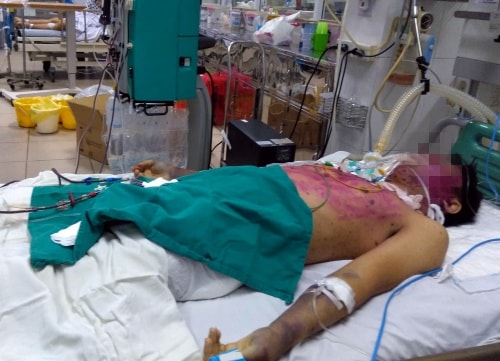Using the wrong medicine to treat chickenpox, 28-year-old man in critical condition
The young man arbitrarily took immunosuppressant corticosteroids, causing the chickenpox virus to flare up, the blisters to get bigger, and there to be bleeding under the skin.
Doctors at the Central Hospital for Tropical Diseases (Hanoi) predict that the condition of the patient from Son La is very serious, with a high risk of death.
The patient was normally healthy, a month ago he had a sore throat and a low fever, the doctor diagnosed him with bronchopneumonia. After a course of treatment, the illness subsided, but in the past 5 days the fever returned, body aches, and blisters appeared. He bought his own medicine, including antibiotics, anti-inflammatory drugs, especially Medrol 16 mg.
|
The patient had very large blisters, subcutaneous bleeding, and bleeding within the blisters. Photo:TC |
After two days of taking medicine, the patient's condition did not improve, so he went to Moc Chau Hospital for examination and was diagnosed with severe complications of chickenpox. The doctor prescribed antibiotics and medicine to coat the stomach lining. One day later, blisters appeared all over the patient's body, the blisters were larger than normal, so he was transferred to the Central Hospital for Tropical Diseases on May 11. The patient was treated with an antiviral regimen for chickenpox, but the response was very poor.
Doctor Vu Minh Dien, Emergency Department, Central Tropical Hospital said, the patient's condition is getting worse, with thick rash, bleeding in blisters, subcutaneous bleeding, blood clotting disorder, loss of clotting factors; severe liver and kidney failure... The patient's prognosis is unlikely to survive.
According to Dr. Dien, the arbitrary use of the wrong medication for the patient's illness has caused the disease to flare up more strongly, which is a factor that aggravates the disease. Medrol is a corticosteroid drug, which has anti-inflammatory and edema-reducing effects, but its side effect is immunosuppression. Therefore, Medrol is not recommended for patients with chickenpox. Chickenpox occurs due to the body's immune system being weakened, the virus flares up, and when immunosuppressive drugs are used, the virus flare-up becomes more severe.
Since the beginning of the year, the Central Hospital for Tropical Diseases has had two patients die from chickenpox, both related to self-medication with corticosteroids.
Doctors warn that this year there are many severe cases of chickenpox, which do not progress as usual. It is recommended that when having a fever and blisters on the skin, patients should go to the doctor and not buy medicine on their own. The disease often appears in people who have not been vaccinated, have a weakened immune system, and have blisters scattered from the head to the feet, very small blisters. If the blisters grow quickly, are larger than normal, and the patient is more tired, they should go to the hospital as soon as possible.
Chickenpox is an acute systemic infection caused by the varicella zoster virus. The disease can occur at any age, often occurring in people with weak or incomplete immune systems, especially young children, the elderly and pregnant women.
In pregnant women, especially during the 13-20 week of pregnancy, due to a weakened immune system, if they get chickenpox, it can lead to miscarriage or leave birth defects (cranial malformations, multiple heart defects, microcephaly in newborns...). Newborns with chickenpox transmitted from their mothers also have a very serious course, with a mortality rate of up to 30%.
The best way to prevent the disease is to get vaccinated. Children need at least 7-10 days to recover and regain weight. Women should be vaccinated before becoming pregnant; they should not be vaccinated if they are already pregnant. Children between the ages of one and 12 need only one dose of the vaccine to protect them. Those 13 and older need two doses, at least six weeks apart.


